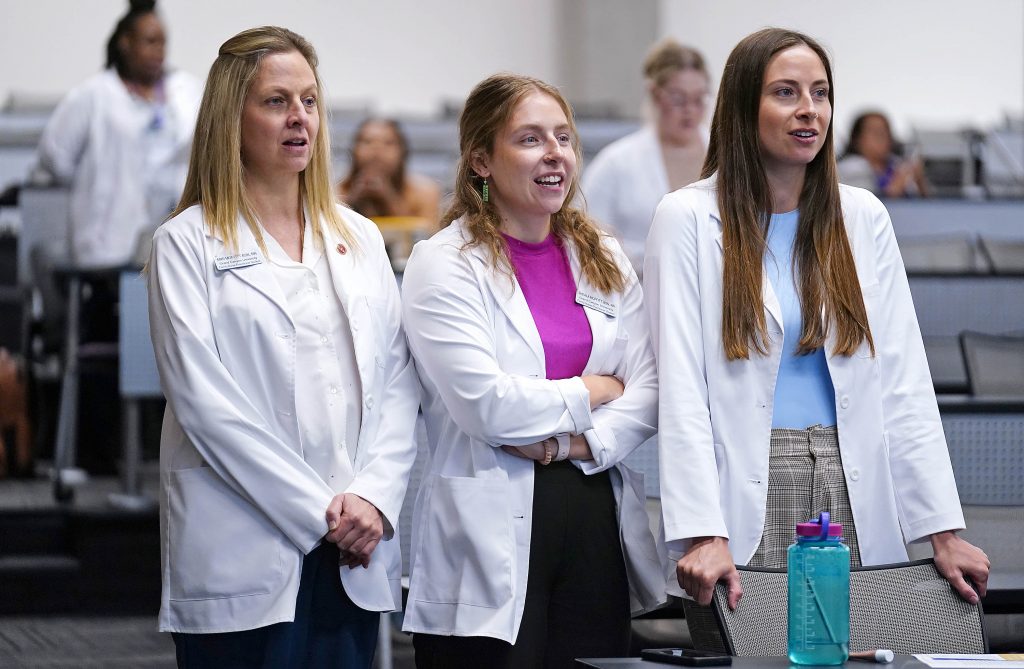
Photos by Ralph Freso
Sheala Moffitt remembers spring break 2020 so clearly: “I left for spring break because of COVID, and then I never came back,” she said of the shelter-at-home directive from Grand Canyon University.
Only, the nursing student HAS come back.
And in her second go-round at GCU, this time to earn her master's degree, she brought her sister, Natasha Agate, and mom, Miki Moffitt, along with her in her academic journey. All three traveled from their hometown of Farmington, New Mexico, recently to join their family nurse practitioner cohort for their white coat ceremony, in which faculty cloak students in white coats and place a special pin on their lapel before they recite an oath of empathy and integrity.
The ceremony is symbolic of the students moving on to the next phase of their career, and for those at the ceremony, that meant the completion of their online classroom work and transition to the final phase of their master’s degree – clinicals, in which they work with real patients at health facilities under the guidance of a fellow nurse practitioner.
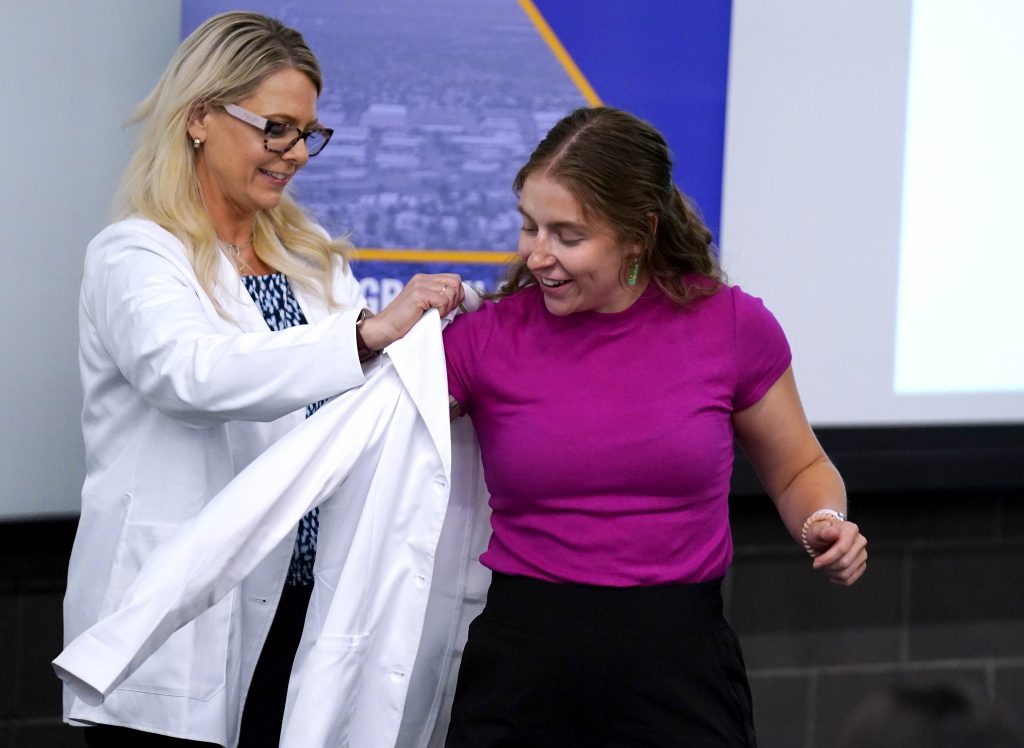
“I had a really good experience with the nursing program and them involving Christianity within it, and I wanted to extend my knowledge, so I figured, why not (come back),” said Sheala, who earned her bachelor’s degree in nursing from GCU. “And I convinced everybody to get on board with it.”
Margie Amity, the Advanced Practice Registered Nurse clinical simulation coordinator, said that the white coat ceremony is monumental for those in the health care profession and, “In the history of the programs, a few husbands and wives have attended together, but this is the college’s first for a family.”
Natasha was in a different nursing program at the University of New Mexico just as COVID was unfurling, graduating just a semester before her sister.
“We both started working right when the pandemic hit, so we kind of entered blind to the pandemic anyway and got thrown into the mix,” Natasha said. “But it really gave us a lot of resilience as providers and also provided opportunities that we wouldn’t have gotten without the pressures of the pandemic.
“We got to do some cool stuff that ultimately led us to want to pursue higher education,” namely their graduate degrees, Natasha said.
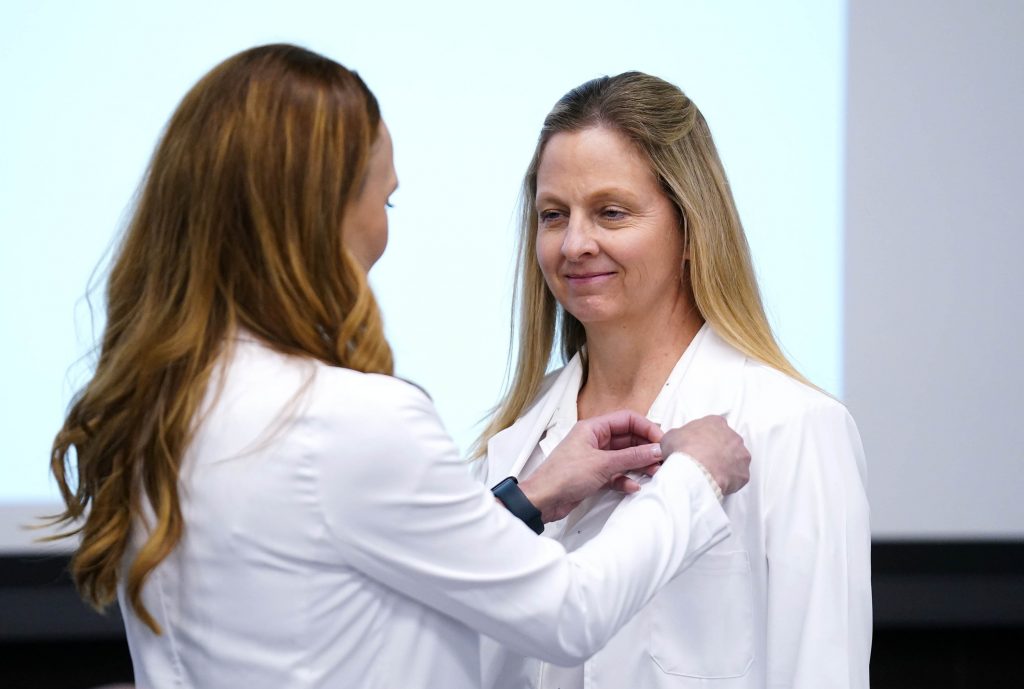
It seemed written in the stars that Miki and daughters Sheala and Natasha would become nurses. It's something that's so important now, as the nation is in the midst of a dire nursing shortage, with the Bureau of Labor Statistics projecting the need for nursing professionals to grow by 6% through 2032, faster than the average for all occupations.
“Our grandmother is actually a nurse, as well, so generations of nurses for sure,” said Sheala, who has known since middle school that she would become a nurse. “I just wanted to make an impact on people’s lives, and I saw the impact my mom got to make on people’s lives, and my grandmother, and I just thought it would be a perfect path.”
Mom Miki said she has thought "forever" about taking that next step to becoming a nurse practitioner.
“But it just wasn’t in the cards. We were raising kids, and then life circumstances,” Miki said from Lopes Hall in Building 71, where proud family members and friends gathered for the white coat ceremony. Sheala told her over and over, “’You need to just go. You need to just do it.’ I was like, ‘I don’t know if I can afford it.’ And then she said, ‘I applied,’ and I was like, ‘Oh no, you didn’t.’ So I applied, and she (Natasha) applied, and we all got in.”
Going through the challenging 2 ½ -year-long master's program together has made things just a little easier for Miki, Sheala and Natasha, who have leaned on each other for support.
“It’s been an amazing experience, not so much that we get to study together, but just being able to toss off each other and just understand what each other’s going through,” Miki said.
Natasha, who started the program just a month after having a baby, said, “I wouldn’t have probably made it this far without them. … They’ve really supported me as far as being able to empathize with me, essentially, and come watch my son and provide support in those ways.
“If we weren’t all going through the program together, they would just hear me complaining late at night or crying because I didn’t have homework done. But they know exactly what I’m going through.”
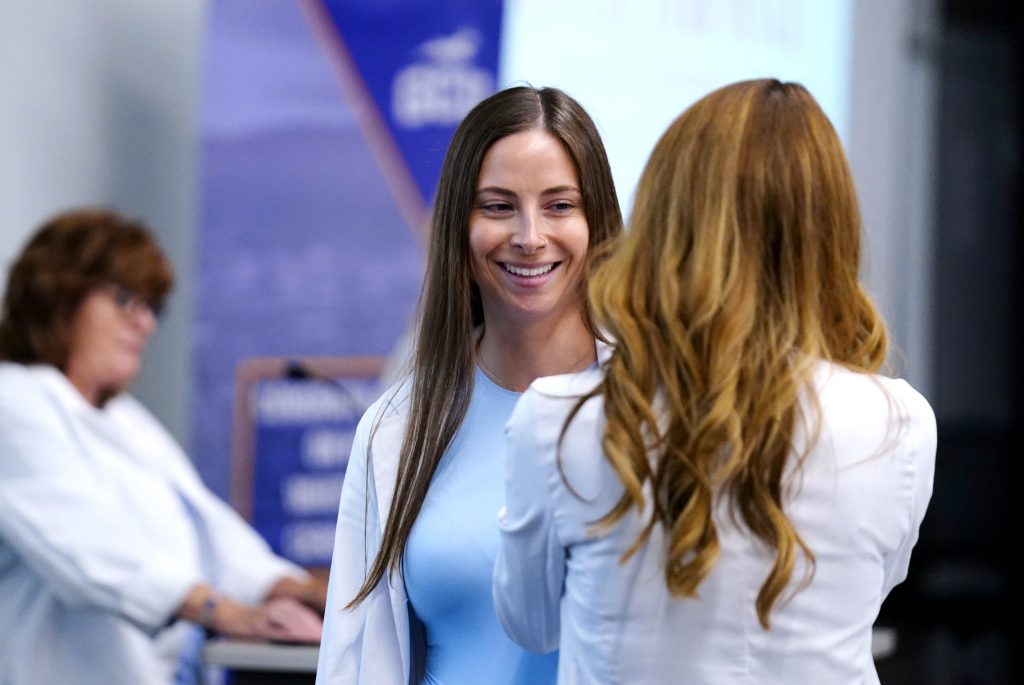
During the white coat ceremony, the trio of women listened to Dr. Lisa Smith, the College of Nursing and Health Care Professions dean, speak via video address of how the nurses in the cohort are transitioning from nursing care providers to medical care providers. But they always will approach their work through a nursing lens, viewing a person holistically and considering all aspects of a person toward their recovery.
And they’ll do that important work from the perspective of a Christian worldview.
“Each of you is unique, and God has equipped you with special gifts, talents and abilities. … Regardless of your distinct path, when you choose to follow the Lord, He will transform lives and the human spirit,” Smith said.
As each student was called to be draped in their white coat, the audience heard a word each of them chose that was meaningful to them and spoke of their academic journey.
For Sheala, it was “fabulous.”
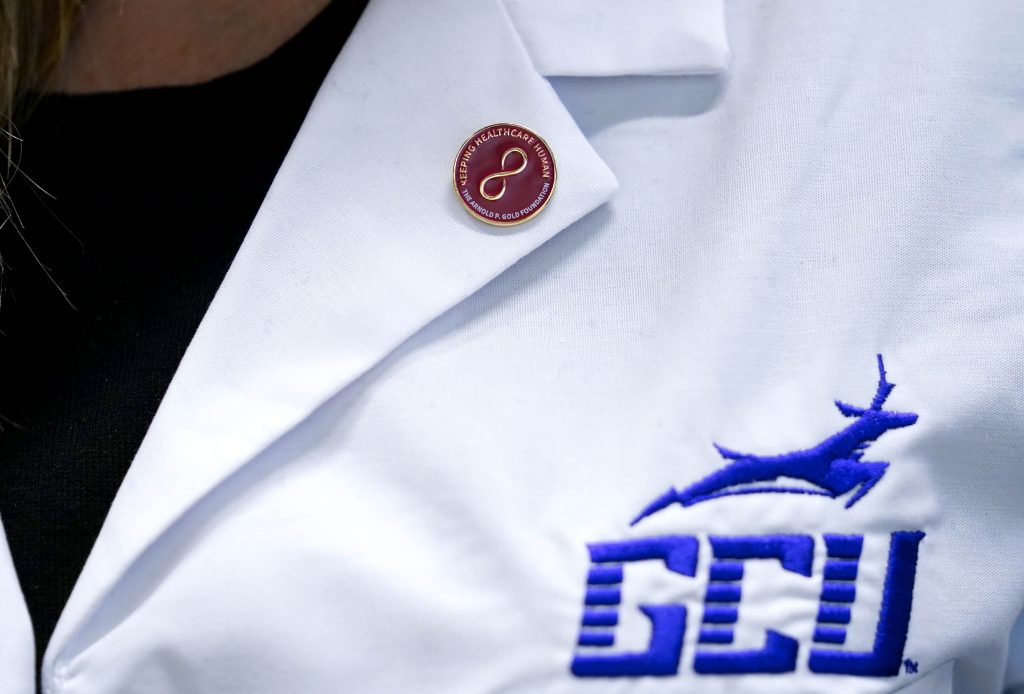
For Miki, she chose “smile.”
And Natasha’s word: “growth.”
All different words, but for this family of nurses, they live their lives with the same heart for caring as they begin their clinicals back home in Farmington: “We all have philanthropic hearts and desires, like Sheala said earlier, to really make an impact on people,” said Natasha. “And you can do that as a nurse in a lot of ways. But we wanted to go even further to help serve our community, and for us, that meant pursuing education to be family nurse practitioners.”
GCU Manager of Internal Communications Lana Sweeten-Shults can be reached at [email protected] or at 602-639-7901.
***
Related news:
GCU News: Nurse who made the move to U.S. finds passion in teaching
GCU News: For pastor, future nurse, it’s all about caring
GCU News: GCU opens new ABSN site in Chandler, addresses nursing shortage



































































